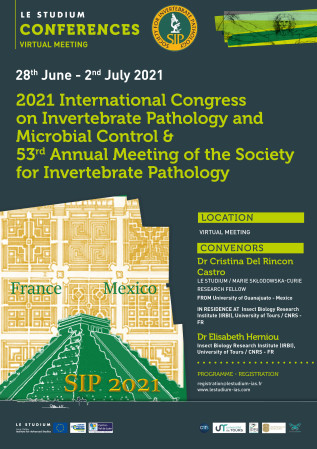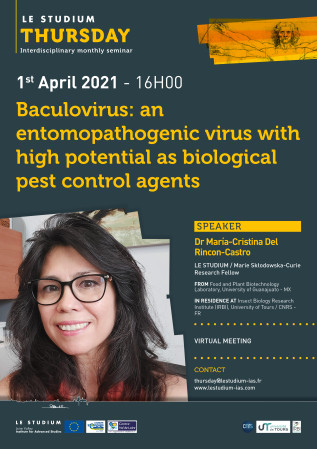Dr María-Cristina Del Rincon-Castro

From
Food and Plant Biotechnology Laboratory, University of Guanajuato - MX
In residence at
Insect Biology Research Institute (IRBI), University of Tours / CNRS - FR
Host scientist
Dr Elisabeth Herniou
PROJECT
Genomic characterisation of six Mexican baculovirus strains with activity against spodoptera frugiperda (lepidoptera: noctuidae)
The search for alternatives to the use of chemical insecticides has led to the investigation of different strains of baculovirus for the control of pests of economic importance for the state of Guanajuato, in Mexico, specifically strains with activity to Spodoptera frugiperda (Lepidoptera: Noctuidae). The laboratory of Food and Plant Biotechnology of the Life Sciences Division Campus Irapuato-Salamanca of the University of Guanajuato, Mexico, has a collection of six SfNPV strains of baculovirus with activity to S. fugiperda previously characterized, finding molecular and biological activity variations, thus implying the need to know these strains at a deeper molecular level. The average lethal concentration (LC50) and molecular characterizations (RFLPs) lead to the knowledge of the effectiveness and differentiation of these different baculovirus strains, but together with phylogenetic studies, it is possible to infer the origin, evolution and kinship links that exist between different species. The objective of this project is to perform the genetic characterization of 6 baculovirus isolates (3 exotic and 3 natives from México) to determine which genetic factors might be involved with increased pathogenicity against S frugiperda. Objective: (1) Genetic characterization of the 6 SfNPV isolates, first to determine if phylogenetic relatedness explain phenotypic similarity (3 genes). Second to determine if particular genomic features could explain phenotypic differences (genome sequencing). (2) Host specificity assays (useful in case of product licencing in Europe).
Publications
Final reports
The fall armyworm Spodoptera frugiperda is recognized as a polyphagous, voracious, and economically important pest in America and other continents. The control of this pest has been used mainly chemical insecticides, but biological control is an alternative strategy, and different isolates of baculoviruses were evaluated for this control. In this work, the biological activity, in vitro susceptibility, phylogenetic relationship, and protein expression in insect cells of six SfNPV baculoviruses isolated from S. frugiperda were determined. The infection of the cell line Sf9 was permissive to four of the five SfNPVs strains and non-infective to the SfGV strain. SfNPV isolates from Argentina, Honduras and the USA were more virulent than those from Mexico, resulting in up to 12 and 1000 times more effectiveness. The genes lef-8, lef-9 y polh/granulin were partially amplified in five SfNPVs and the SfGV, where nucleotide changes were identified in lef-8 of the SfNPVs and lef-8, lef-9, and granulin from SfGV-RV. The phylogenetic analysis showed that the five strains SfNPVs turn out to be closely related to the others reported SfNPV, just like the strain SfGV-RV and SfGV. The protein expression of host cells in response to SfNPV-Fx identified six proteins differentially expressed. They are involved in changes in the host cell, altering its cellular structure and normal functions. The characterization from these six SfNPV strains has established the basis for exploring the specific mechanisms, evolution, and ecology to evaluate the potential to be used as biological control agents against S. frugiperda.


